Glenn Lewis is Bringing Art and Craft Together Again
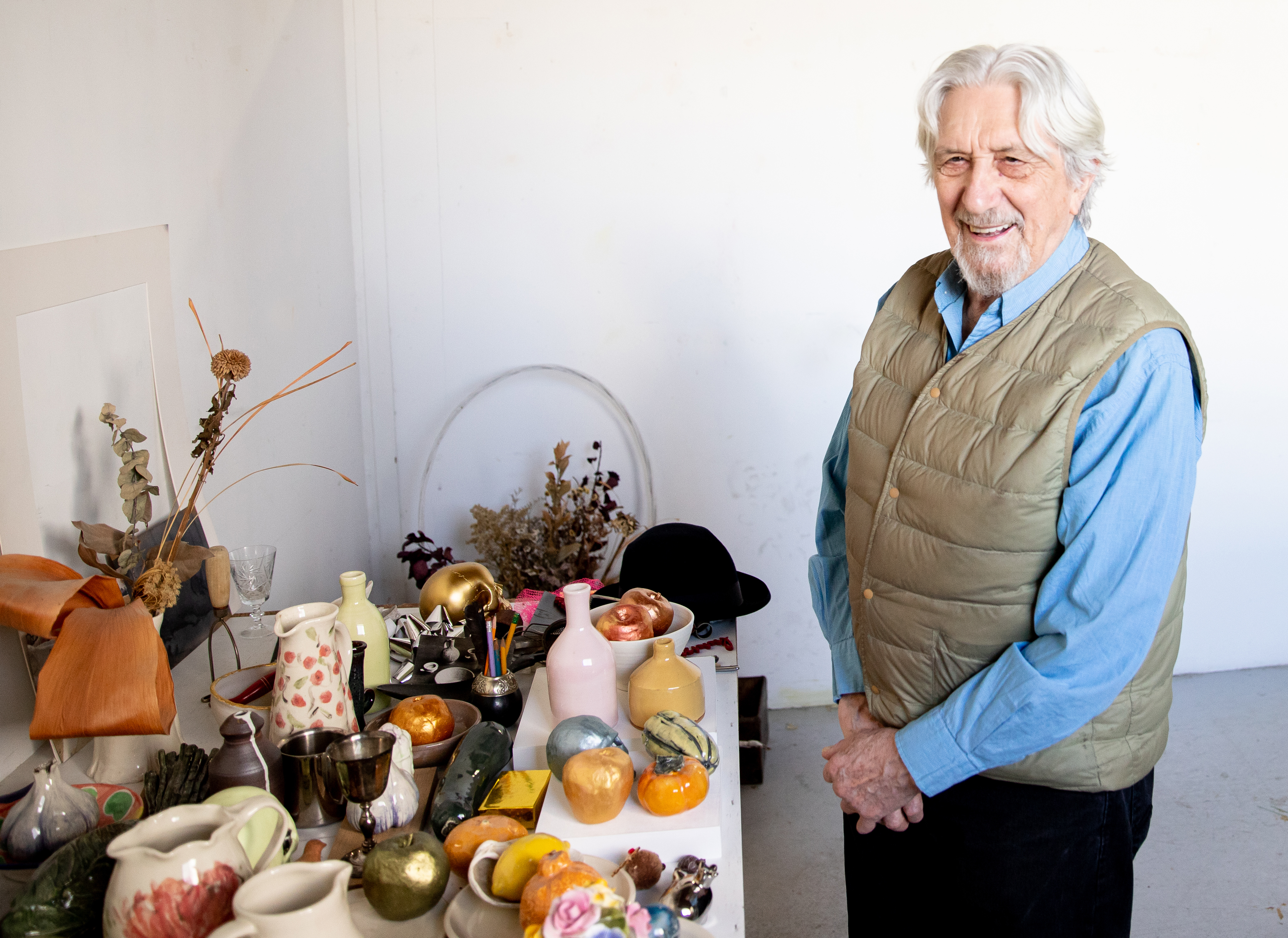
Artist and 2023 ECU Honorary Degree recipient Glenn Lewis in his East Vancouver studio in April, 2023. (Photo by Perrin Grauer)
Posted on
The influential artist, educator and 2023 recipient of an honorary degree from Emily Carr University reflects on the lessons of a storied career.
A pair of artworks sit near the door to Glenn Lewis’ East Vancouver studio. Parked amidst a sprawling archive of objects, images, ceramics and paper records, you’d be forgiven for missing them. Balanced atop a flat-footed stainless-steel plinth are a ceramic teacup, saucer and handled tray, all crafted as a single piece. On the wall above, a photograph hangs over a shelf bearing a quartet of ceramic vessels.
The teacup sculpture was made in 1968. The photograph and vessels in 2017. Two works separated by inches and a half-century. The juxtaposition makes a fitting metaphor for Glenn’s wide-ranging practice. From ceramics, photographs and sculptures to videos, performance works and correspondence art, Glenn increasingly directs his work toward a singular purpose.
“I want to put craft and art back together again,” he tells me.
Glenn often points to the ancient Greek word technē as shorthand for this aim.
“The ancient Greeks didn’t have a word for ‘art,’” he tells me. Technē encompasses both the work of technical production and the accompanying intellectual work of contemplation. It gestures toward to the inseparability of art and life. And it disempowers classist and colonial ideas about art as a rarified field.
Through this lens, placing a teacup and saucer on a plinth takes on radical significance. Meanwhile, Glenn’s 2023 photograph shows two workspaces. The first is a studio/office in Cornwall belonging to famed ceramicist Bernard Leach. The second is an empty study in a Bauhaus building in Dessau, Germany.
Bernard’s studio is a space where Glenn’s collision of art and craft literally takes place. The Bauhaus study represents Modernism’s separation of ideas from the work of fabrication. In a sense, the photograph diagrams opposing forces. Hung above a short shelf bearing four ceramic vessels, the photo gathers complexity. It charts the tensions and operations that define much of Glenn’s artistic project. And it clearly demonstrates that he has skin in the game.
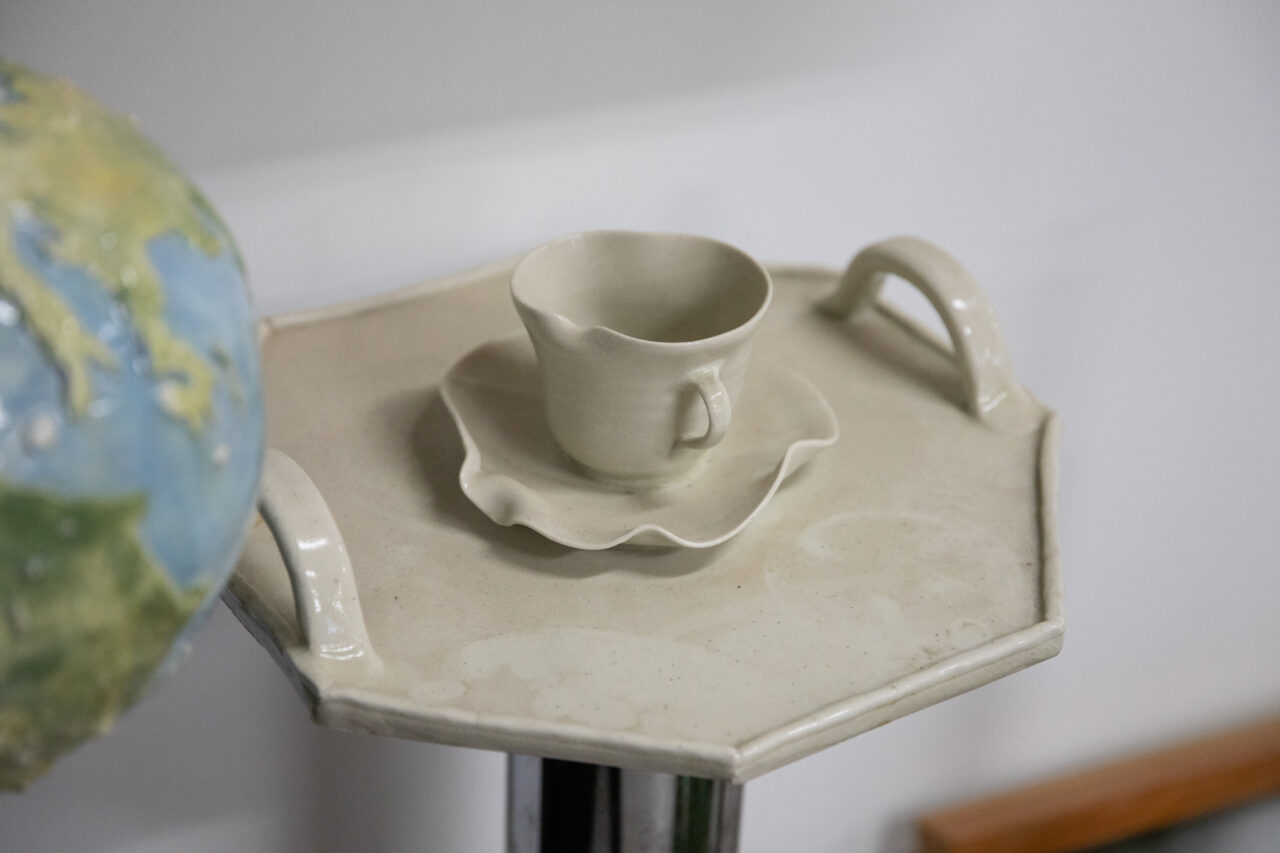
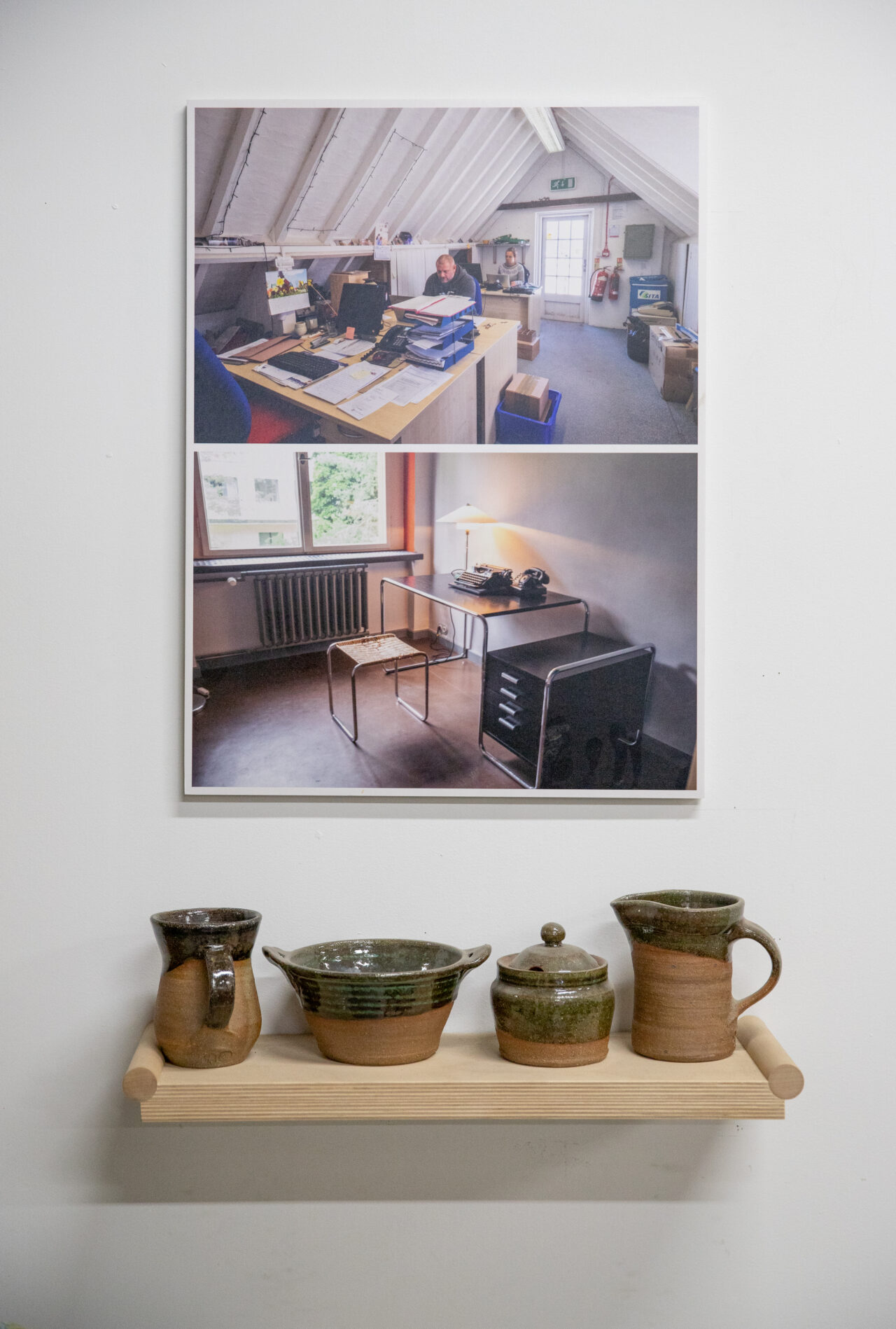
Top: Balanced atop a flat-footed stainless-steel plinth are a ceramic teacup, saucer and handled tray, all crafted as a single piece (1968). Bottom: Hung above a short shelf bearing four ceramic vessels, the photograph (2017) charts the tensions and operations that define much of Glenn’s artistic project. (Photos by Perrin Grauer)
Now 87 years old, Glenn suggests the world is finally catching up with him.
“There’s been a resurgence in craft,” he says. “Younger people are turning to making stuff on their own. They’re more interested in things that are handmade.”
And they often value handmade items with a reverence formally reserved for objects of contemplation, he adds.
It’s partly for this decades-long project that Glenn is one of two 2023 recipients of an honorary degree from Emily Carr University. But Glenn’s career also includes groundbreaking contributions to the arts throughout BC and beyond.
The Chemainus-born artist was involved in seminal artist’s collectives and artist-run centres including Intermedia and the New Era Social Club. He was a founding member of Western Front. He co-founded Longlands pottery in Devon, UK, in 1964. And he developed several programs during his tenure as head of Media Arts at the Canada Council for the Arts.
Glenn’s 1968 Dusty Worker in Flour Piece is often credited as the first performance work in Canada. But Glenn is quick to point out that Canadian artists including Gathie Falk were experimenting in the medium at least as early as himself. His prolific output in video in the 1980s positioned him as an early and prescient critic of the broadcast medium.
Glenn is a longtime educator. He taught high school in Maple Ridge, and taught undergraduate and graduate programs at schools ranging from UBC to the New York State College of Ceramics at Alfred University. And he continues to participate as a mentor in the Shumka Centre for Creative Entrepreneurship’s Art Apprenticeship Network program.
He is a 1958 Honours graduate of Emily Carr University — then known as the Vancouver School of Art. He studied pottery under Bernard Leach from 1961 to 1963. In 2007, he received the prestigious Emily Award from ECU. And in 2017, Glenn received a Governor General’s Award in Visual and Media Arts.
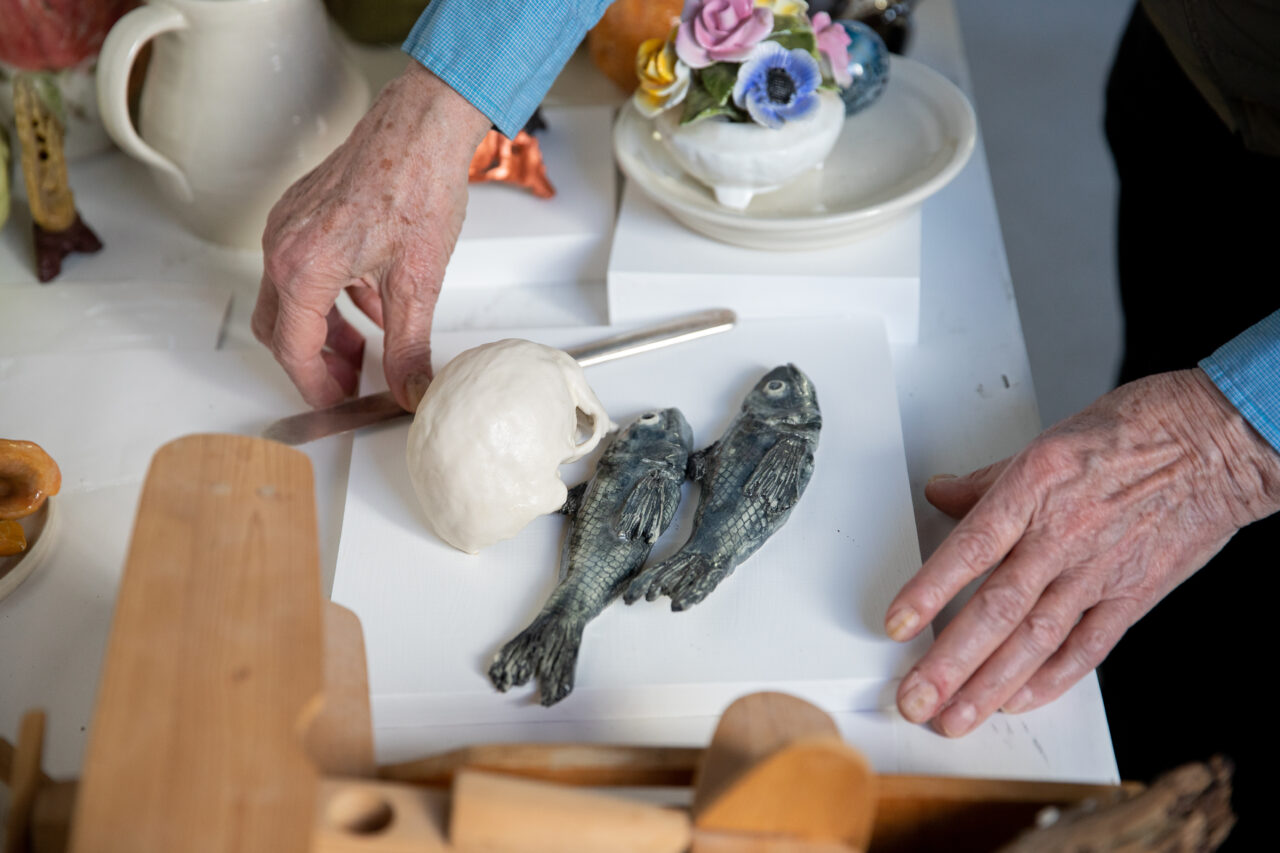
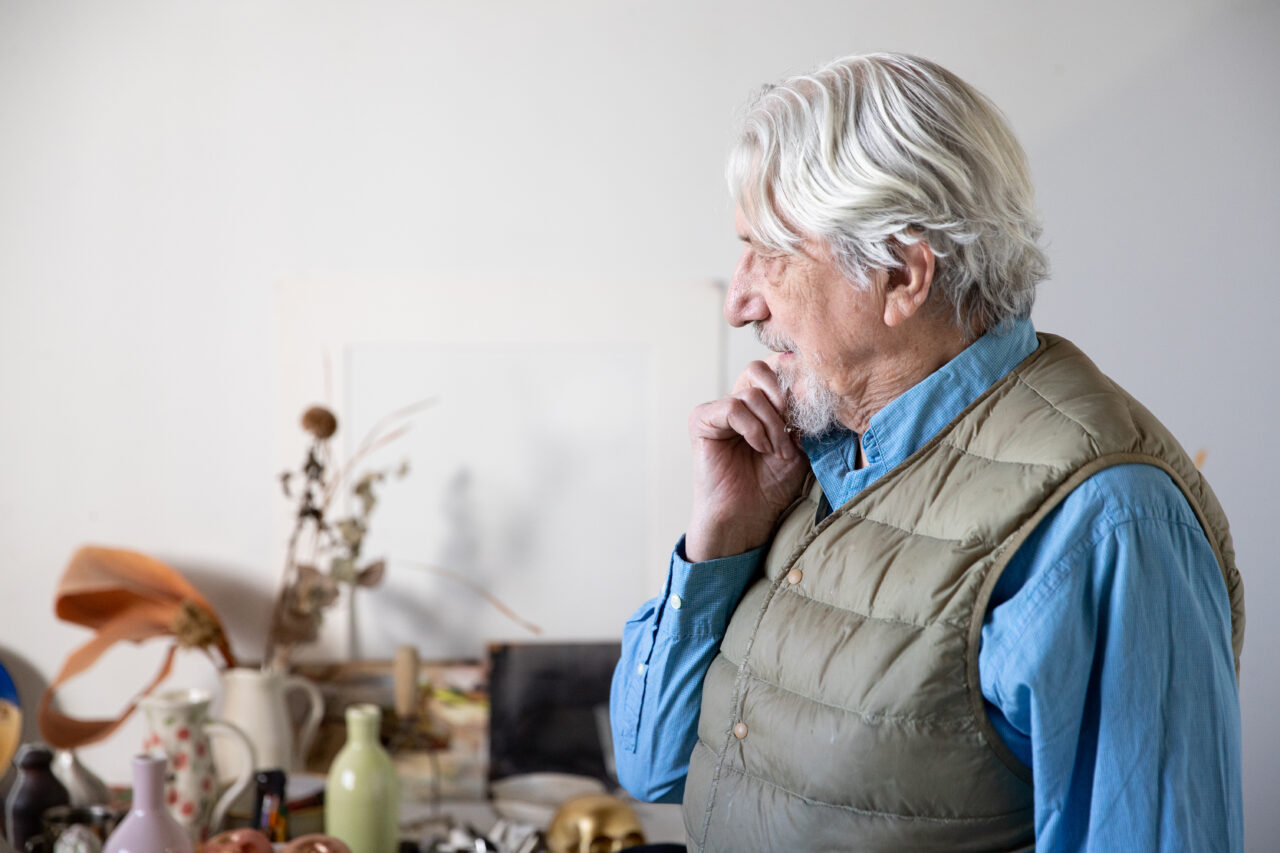
Top: Among the many and sundry items adorning a table in Glenn's studio are a reproduction of a skull Glenn made while a student at the Vancouver School of Art, now Emily Carr University, and a pair of ceramic fish. Bottom: “You make the same thing over and over and over again. That gives you a very powerful knowledge.” (Photos by Perrin Grauer)
An exploration of the tension between utility and wonder colours Glenn’s decades of work. Unfailingly, he conducts this exploration with a sparkle in his eye. He tells me that a lightness of touch helps connect an artwork to the real world. And it prevents art from assuming an overly lofty position.
“My work has a certain amount of humour in it,” he says. “It’s subtle. Sometimes it’s kind of edgy. But humour makes things more lifelike. More like a community or part of our everyday life. It grounds the work in reality.”
Glenn is a keen observer of the everyday. His walks between his Hastings-Sunrise home and studio double as opportunities to take in the visual world. This emphasis on awareness and perception helps further ground Glenn’s work in the living world. Which, he notes, is the wellspring of all things poetic.
“What I mean by poetic is a way of thinking,” he tells me. “It’s not rational. It’s not about logic. It’s a way of looking, of seeing something and bringing it to bear.”
This kind of deep looking can be honed through repetition, he adds.
“You make the same thing over and over and over again,” he says. “And that enables you to see minute variations. It teaches you how to see; how to distinguish between slight differences. That gives you a very powerful knowledge. And that’s the way I think we need to see things.”
Read our announcement about this year’s Honorary Degree and Emily Award recipients at ecuad.ca.
Visit Glenn’s website to learn more about his work.
Visit ECU online to learn more about studying Visual Arts at Emily Carr.